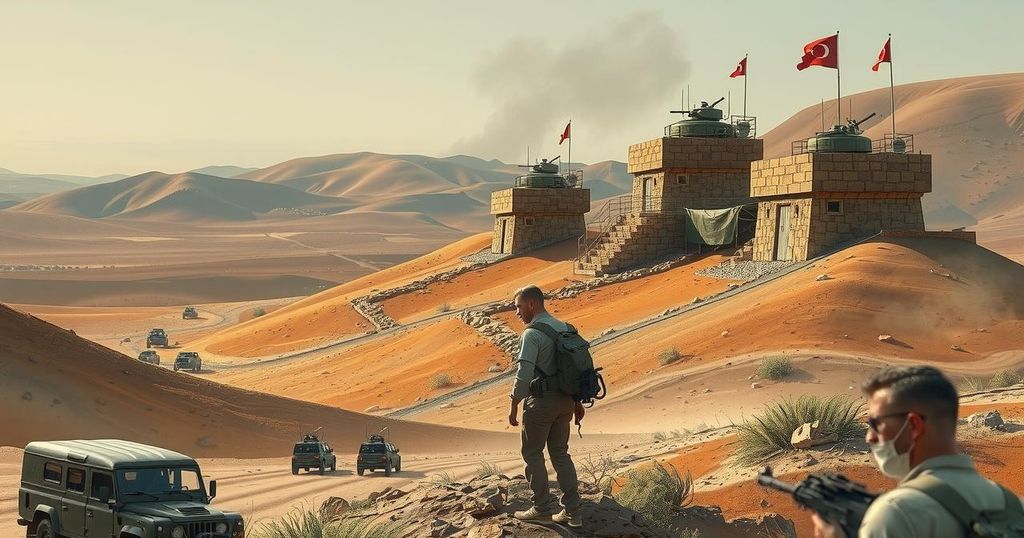Syria Post-Assad: Competing Influences of Turkiye and Israel in the New Landscape
The removal of Bashar al-Assad has shifted the power dynamics in Syria, with Turkiye focusing on Kurdish threats and Israel targeting Iranian influence. Both nations are exerting their influence, leading to heightened military operations and complex negotiations for the new Syrian administration. Regional and global powers add layers of complexity to Syria’s future, emphasizing the need for careful diplomacy.
The departure of President Bashar al-Assad on December 8, 2024, signifies a pivotal moment in Syria’s history, enabling a shift in regional dynamics influenced by Turkiye and Israel. Both nations are working to exert their influence over Syria, with their conflicting interests potentially reshaping the Middle East’s stability for years to come.
Since the Syrian civil war began in 2011, Turkiye has assumed a crucial role by aligning with opposition groups, actively combating al-Assad’s regime. Currently, Turkiye’s main focus is on halting the emergence of a Kurdish entity along its southern border, which it views as a security threat. Consequently, Turkiye has intensified military operations in northern Syria, particularly against the Syrian Democratic Forces (SDF), and has launched significant offensives like the December 2024 Manbij offensive.
Turkiye’s military operations have caused substantial casualties among both Kurdish forces and civilians, disrupting Kurdish self-governance initiatives in northern Syria. With over 10,000 troops stationed at the border, Turkiye aims to solidify its territorial influence, evidenced by the construction of new military outposts and investment in infrastructure in areas with Kurdish populations. The strategy aims to change the demographic character of northern Syria in favor of pro-Turkish factions.
In parallel, Israel has sought to prevent Iran and Hezbollah from strengthening their positions in the wake of al-Assad’s regime’s decline. Israel has responded proactively with multiple airstrikes targeting Iranian military infrastructure and Hezbollah positions across Syria, emphasizing the necessity to counter potential threats. Reports indicate over 80 airstrikes were conducted in just a few months to disrupt Iranian supply routes and command centers.
Amid these complexities, President Ahmed al-Sharaa’s administration finds itself negotiating between the conflicting interests of Turkiye and Israel. While Turkiye has solidified its influence, current discussions regarding Turkish military bases in Syria reflect Damascus’s struggle to maintain sovereignty amid rising foreign presence. Simultaneously, Syria’s diplomatic approach towards Israel appears more pragmatic than previously, focusing on regional stability.
Despite non-engagement in direct military hostilities, indirect tensions between Turkiye and Israel exist due to their conflicting support of various factions in Syria. Turkish-backed groups can pose security threats to Israel, complicating the landscape further. The intelligence rivalry has equally escalated, with both nations monitoring military activities, raising concerns about changing allegiances on the battlefield.
Looking toward a potentially tumultuous future, Syria’s new administration must navigate not only the competing ambitions of Turkiye and Israel but also the interests of other regional and global powers such as the U.S., Iran, and Russia. Each player has established their stakes in the evolving Syrian theater, complicating any pathways towards stability and reflecting broader geopolitical tensions.
The ousting of President al-Assad has initiated a transformation in Syria, with Turkiye and Israel vying for influence amid changing regional dynamics. Turkiye’s military focus on Kurdish forces contrasts with Israel’s operations aimed at countering Iranian influence. President al-Sharaa’s government faces significant challenges in balancing ties with both nations while maintaining internal stability and sovereignty. The entangled interests of global powers further complicate Syria’s path forward, making it essential for the new administration to navigate these complexities effectively.
Original Source: shafaq.com




Post Comment